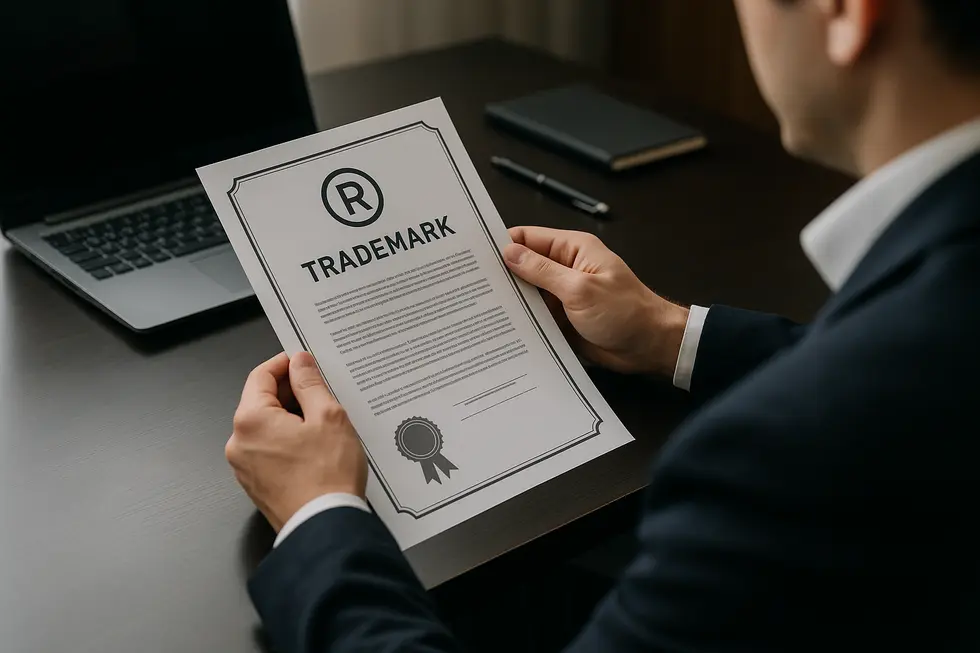Introduction
Trademarking your business name is a pivotal step in safeguarding your brand’s identity. As a business owner, understanding the distinctions between state registration and federal trademarking can be crucial, particularly if your operations span multiple states or even nationwide. This guide delves into the advantages of trademarking not just your business name, but also logos and slogans, helping you build a resilient brand reputation. Each chapter will explore how these elements strengthen your business strategy and legal footing.
Tables of Contents
Chapter 1: Legal Protections in Trademarking Your Business Name
- Secure Nationwide Rights and Legal Protections with Business Name Trademarking
- Enforcing Trademark Rights: Legal Tools for Protecting Your Business Name
- Public Record: Deterrence through Transparency
- How to Maintain Your Trademarked Business Name: Essential Monitoring Practices
- Mastering the Trademark Search and Registration Process for Strong Legal Safeguards
Chapter 2: State Registration vs. Federal Trademarking of Business Name
- Understanding Geographic Protection: State vs. Federal Trademark Coverage
- Understanding Cost Dynamics: State vs. Federal Trademark Registration
- Navigating State and Federal Registration: A Comparative Guide
- Navigating Legal Protections: State Registration Compared to Federal Trademarking
- Strategic Advantages of Nationwide Protection in Trademarking
Chapter 3: Importance of Trademark for Multi-State and National Business Operations
- Comprehensive Legal Protections through Federal Trademark Registration
- Strategic Roles of Trademarks for National Market Leverage
- Strengthening Brand Equity through Strategic Trademarking for National Growth
- Streamlined Trademark Strategies for Harmony Across State Lines
- Navigating Global Trademark Challenges for Expanding Enterprises
Chapter 4: Trademarking Business Name: Logos, Slogans, and Brand Identifiers
- Decoding Trademark Elements: Protecting Names, Logos, and Slogans
- Understanding the Legal Matrix of Business Trademarking
- Navigating the Trademark Process for Business Name, Logos, and Slogans
- Navigating the Benefits and Drawbacks of Trademarking: Ensuring Brand Security
- Establishing Ownership and Protecting Brand Identity: Key Steps and Long-term Strategies
Chapter 5: Harnessing the Power of Trademarking for Business Strategy
- The Strategic Edge: Exclusive Rights in Trademarking Business Names
- The Strategic Edge of Legal Ownership Presumption in Trademarked Business Names
- Strategic Nationwide Shield: Elevating Your Brand with Trademark Protection
- Boosting Brand Reputation Through Strategic Trademarking
- Leveraging Strategic Trademarking for Business Growth and Expansion
Chapter 1: Legal Protections in Trademarking Your Business Name

1. Secure Nationwide Rights and Legal Protections with Business Name Trademarking
Registering your business name as a trademark confers nationwide exclusive rights via the USPTO, precluding others from using similar names in your industry. This allows you to employ the ® symbol and take legal action against infringements, fortifying brand identity. Furthermore, federal trademark registration demands periodic renewal to sustain protection. Discover the registration process and benefits, beyond state-level limitations.
2. Enforcing Trademark Rights: Legal Tools for Protecting Your Business Name
Trademark registration grants exclusive rights to use your business name, supported by various legal enforcement mechanisms. Initial steps often involve sending cease-and-desist letters to alleged infringers, enhancing legal ground for subsequent litigation to seek injunctions or damages. In some jurisdictions, administrative actions are available, offering trademark owners remedies through regulatory bodies. Online platforms like Amazon provide additional enforcement tools when registered trademarks are involved Insightful Article.
3. Public Record: Deterrence through Transparency
A trademark becomes publicly listed with the USPTO, signaling your legal claim and deterring infringement. This record helps avoid conflicts as others must check existing marks before usage. Federal registration permits legal action, such as lawsuits against cybersquatters. After five years, trademarks can become incontestable, strengthening deterrence. Furthermore, monitoring tools like the Trademark Official Gazette allow early opposition to similar marks, preserving brand integrity. Learn more about affordable trademark attorney services here.
4. How to Maintain Your Trademarked Business Name: Essential Monitoring Practices
Ongoing monitoring of your trademark ensures legal protection and brand integrity. Manual monitoring involves searching trademark terms online to spot violations. Automated services like the USPTO system efficiently notify you of conflicts, while professional services offer comprehensive checks, useful for global businesses. Regular monitoring aids in detecting infringements early, safeguarding your business name and preventing customer confusion. More insights can be found in our trademark registration guide.
5. Mastering the Trademark Search and Registration Process for Strong Legal Safeguards
Embarking on the journey of trademarking your business name starts with a comprehensive trademark search using databases like the USPTO’s TESS to ensure uniqueness. Proceed by preparing a detailed trademark application, laying out your business and mark specifics, planned usage, and classification under the USPTO’s 45 classes. Once submitted via TEAS, your application is examined for legal soundness and conflicts. Post-approval, it’s published in the Official Gazette, allowing for public opposition. A successfully unchallenged trademark grants exclusive rights, elevating your brand’s market credibility. For efficient searching, visit PatentPC – How To Search USPTO Database, and for registration guidance, check Rocket Lawyer – How To Register A Trademark.
Chapter 2: State Registration vs. Federal Trademarking of Business Name

1. Understanding Geographic Protection: State vs. Federal Trademark Coverage
When it comes to trademarking your business name, the geographic scope of protection significantly differs between state and federal registration. State trademark registration provides rights restricted to the specific state where the mark is registered, offering limited local protection. In contrast, federal trademark registration through the USPTO ensures nationwide exclusivity, safeguarding your business name across all U.S. states and territories. Without federal registration, another entity could register a similar mark nationally and disrupt your expansion efforts. Furthermore, federal trademarks benefit from the “zone of natural expansion” doctrine, granting reasonable expectations for market growth.
For more on the importance of broad trademark protection, visit this guide on registering trademarks in Georgia.
2. Understanding Cost Dynamics: State vs. Federal Trademark Registration
When deciding between state registration and federal trademarking, cost plays a pivotal role. State registrations are low-cost, perfect for businesses with budget constraints and local operations, ranging merely from $25 to a few hundred dollars. On the other hand, federal registration, although carrying a price tag of $250 plus potential attorney fees, offers nationwide protection. This can be crucial for those eyeing national expansion, as the broader protection offers greater security against infringements, notwithstanding the higher upfront investment.
3. Navigating State and Federal Registration: A Comparative Guide
Understanding the application process for securing your business name is crucial, whether you are considering state registration or federal trademarking. For state registration, you start by verifying the name’s availability through your state’s resources, then file a DBA or equivalent, and for entities like LLCs, submit formation documents. Federally, the process involves conducting a clearance search, filing through USPTO’s TEAS, and waiting through examination and potential opposition periods. These methods, state-level and federal, differ significantly in scope and protection, emphasizing the importance of aligning them with your business goals.
4. Navigating Legal Protections: State Registration Compared to Federal Trademarking
Federal trademark registration is crucial for nationwide brand protection. It offers exclusive rights across all states, a presumption of ownership, and significant enforcement avenues. Businesses can leverage federal courts and Customs to halt infringements. Conversely, state registration is limited to its jurisdiction, offering only basic local protection. Ideal for smaller businesses, it is quicker yet lacks federal advantages for broader enforcement. For expansive brand security, federal registration proves indispensable. Learn about affordable trademark attorney services.
5. Strategic Advantages of Nationwide Protection in Trademarking
Federal trademark registration offers broad, strategic protection across the U.S., whereas state registration is limited to one state. A federal trademark provides exclusive rights nationwide, legal presumptions, and potential international protections—important for businesses aiming to grow and secure their brand long-term. For those only operating locally, state registration may suffice, but for lasting security, prioritize federal registration. Affordably secure your brand with expert trademark assistance.
Chapter 3: Importance of Trademark for Multi-State and National Business Operations

1. Comprehensive Legal Protections through Federal Trademark Registration
Navigating the complexities of multi-state business demands robust legal safeguards. Federal trademark registration is essential, offering nationwide priority and ownership rights. It enables businesses to assert their brand against unauthorized use, maintaining brand recognition across states, and aids in legal enforcement via federal courts, which typically provide more consistent rulings. Furthermore, using the ® symbol publicly signals these protections, effectively deterring potential infringers from encroaching on valuable brand territory. For more details, explore ZenBusiness Trademark Information.
2. Strategic Roles of Trademarks for National Market Leverage
Trademarks are vital for national businesses navigating competitive markets. They establish clear brand identity, ensuring consumer trust and loyalty. This legal safeguard allows businesses to protect against infringement, creating barriers to unfair competition. Moreover, trademarks enable strategic market expansion through licensing, facilitating broader reach without steep operational costs. Also, they bolster investor confidence by showcasing committed brand protection, important for growth and industry positioning.
3. Strengthening Brand Equity through Strategic Trademarking for National Growth
A federal trademark offers nationwide protection, securing legal exclusivity even in untapped markets. It’s vital for nationwide expansion, enabling smooth market entry by assuring regulators and partners of brand commitment. Trademarks build trust through consistent brand identity, enhancing customer loyalty and simplifying licensing deals. A comprehensive trademark portfolio increases business valuation and attracts investors. For businesses ready to expand, trademark registration is a strategic asset vital for harnessing national growth opportunities.
4. Streamlined Trademark Strategies for Harmony Across State Lines
For businesses seeking multi-state operational consistency, developing a uniform trademark protection framework is crucial. Start with comprehensive trademark searches to avoid conflicts. Focus on priority registrations in states with significant operations, and leverage tools like the Madrid Protocol for broader reach. Implement license agreements to uphold brand standards across locations. Embrace a hybrid compliance approach to balance national policies with local needs, using centralized management tools to automate enforcement and renewals efficiently.
5. Navigating Global Trademark Challenges for Expanding Enterprises
Trademarking internationally necessitates awareness of systems like the Madrid Protocol for efficient registration across multiple nations. Businesses face legal variations, requiring tailored applications to respect local laws. Treaties like TRIPS facilitate cross-border enforcement, while strategic localization ensures cultural relevance (Coca-Cola‘s approach in China showcases this). Licensing offers growth via local partnerships. Explore detailed guidance on international trademark registration.
Chapter 4: Trademarking Business Name: Logos, Slogans, and Brand Identifiers

1. Decoding Trademark Elements: Protecting Names, Logos, and Slogans
To effectively trademark your business name, one must understand the core elements: the business name, logos, and slogans. These brand identifiers help distinguish your products and services. A trademark legally protects these elements, granting you exclusive rights and preventing competitors from creating market confusion. When filing, you need a clear description of goods/services and proof of use in commerce. Comprehensive protection may extend to trade dress, covering your brand’s overall look and feel.
2. Understanding the Legal Matrix of Business Trademarking
Navigating the legal maze of trademarking business names encompasses various forms: Standard Character Marks offer flexibility by protecting the wording itself, while Special Form Marks secure specific designs.
Distinctiveness and originality are crucial for eligibility, preventing confusion with existing trademarks. Beyond names, slogans and domain names can be protected if they uniquely identify goods or services.
Trademark registration empowers businesses with legal tools to safeguard their brand identity, including using symbols like ™ and ® to signify ownership, ensuring competitive distinction and security.
3. Navigating the Trademark Process for Business Name, Logos, and Slogans
Trademarking business names, logos, and slogans is a meticulous process involving key steps via the USPTO. Conduct a trademark search to avoid conflicts, prepare an exhaustive application detailing owner and goods/services, select a filing basis, and file online using TEAS—fees per class apply. The USPTO reviews, and upon clearing oppositions, grants a registration certificate. Maintain renewal every 10 years to guard against infringement. Discover more on affordable trademark attorney services.
4. Navigating the Benefits and Drawbacks of Trademarking: Ensuring Brand Security
Trademarking your business name, logo, or slogan offers exclusive nationwide rights, crucial for protecting brand reputation. These trademarks empower businesses legally to tackle copycats and maintain distinctiveness in the marketplace, vital for growth. However, enforcement lies with the owner, creating responsibilities. Trademarks cover specific goods/services classes, requiring attention to expansion strategies and renewal obligations. For brands operating in multiple states, federal registration is indispensable for securing intellectual property. Consider how a low-cost trademark attorney can help manage and protect these assets.
5. Establishing Ownership and Protecting Brand Identity: Key Steps and Long-term Strategies
Trademark registration is crucial for maintaining and enforcing exclusive rights to business identifiers like logos and slogans. Start by registering trademarks at state or federal levels through the USPTO, gaining protection against similar uses nationwide. Regular monitoring is essential to identify infringements promptly, employing trademark watch services or legal counsel. Enforcement can involve legal action or cease and desist letters to ensure your brand remains distinct and reputable. Long-term strategy requires maintaining registrations with timely renewals. Learn more for specifics on trademark registration.
Chapter 5: Harnessing the Power of Trademarking for Business Strategy

1. The Strategic Edge: Exclusive Rights in Trademarking Business Names
Exclusive use rights through trademarking form a cornerstone of astute business strategy. By securing a trademark, a business ensures singular authority over its name or brand identifiers, shielding against competitors and preserving brand integrity. This exclusivity builds consumer trust and establishes market uniqueness, paving the way for premium product positioning and sustained growth. For insight on establishing trademarks across jurisdictions, see Register Trademark Georgia.
2. The Strategic Edge of Legal Ownership Presumption in Trademarked Business Names
Trademark registration offers a legal presumption of ownership, crucial for strategic brand management. Securing a registered trademark grants exclusive nationwide rights, unlike common law’s limited area coverage. This presumption acts as prima facie evidence in courts, strengthening legal cases. It also provides public notice, deterring misuse of similar marks. Importantly, registered trademarks can be recorded with customs to block counterfeit imports. For comprehensive protection, especially in federal disputes, registration is indispensable. Source
3. Strategic Nationwide Shield: Elevating Your Brand with Trademark Protection
Securing a trademark provides critical nationwide protection, a strategic tool for any business aiming for growth and dominance. This exclusive right eliminates geographical limits, empowering businesses to prevent others from using confusingly similar names across the nation. Federal registration bolsters ownership claims, enhances brand trust, and increases asset value, which aids in licensing opportunities. Avoid the vulnerability of common law rights; ensure your brand is recognized and defended nationwide.
4. Boosting Brand Reputation Through Strategic Trademarking
An integrated business strategy is key in enhancing brand reputation. It begins with conducting audits to assess current perception and adopting SEO and PR strategies to boost visibility. Consistent feedback management and maintaining cohesive brand identity across all touchpoints are essential. Registering a trademark offers vital legal protection and market differentiation, ensuring ownership presumption and nationwide coverage. This strategic framework enhances brand reputation, safeguarding intellectual assets for sustained growth. For legal guidance, you might consult affordable trademark attorney services.
5. Leveraging Strategic Trademarking for Business Growth and Expansion
Strategic trademarking is essential for business expansion, offering exclusive rights that prevent competitor encroachment as you enter new markets. By using frameworks like the Madrid Protocol, businesses can efficiently secure global trademark protection, enhancing credibility and smoothing market entry. Licensing trademarks also facilitates expansion by utilizing local expertise, preserving brand integrity. To ensure robust protection, choose distinctive marks, conduct thorough legal searches, and actively monitor for infringement. For more on global management strategies, visit patentpc.com.
Final thoughts
Trademarking your business name is more than a legal formality; it’s a strategic move to protect and enhance your brand. By understanding and utilizing trademarks effectively, you can prevent unwarranted use, bolster your brand’s reputation, and gain a competitive edge in the marketplace. Whether starting up or expanding, securing your brand identity through trademarking is paramount for sustained success.
Get your trademark today! Thousands have protected their brand by filing a trademark. What are you waiting for? Start your trademark application!
About us
The globe’s top website for registering trademarks and safeguarding your brand, name, logo, or slogan.







